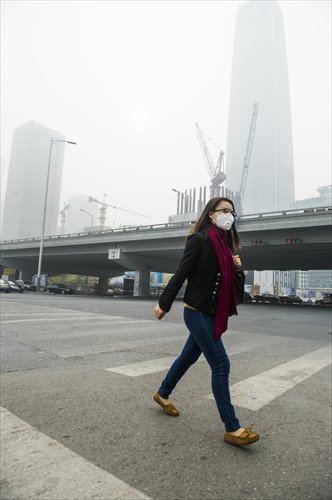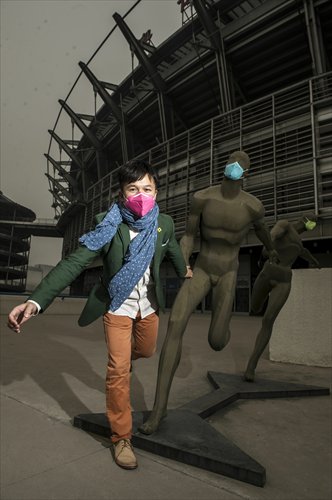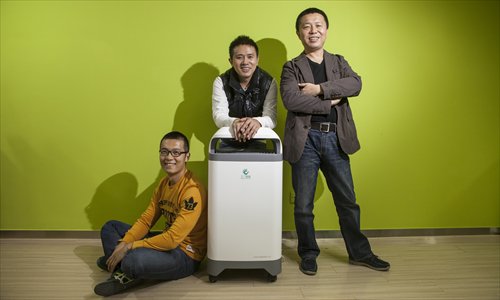Citizens’ war on smog
A number of innovative crowdfunded products have appeared to combat China’s air pollution problem

Severe air pollution in China's major cities has led many to resort to wearing masks. Photo: Li Hao/GT
Guo Rui, a 32-year-old housewife, was scouring the Internet for an air purifier, when a friend told her about an innovative new model that was seeking crowdfunding on JD.com.
It was called the Three Papa, to draw attention to the fact that the three entrepreneurs behind the machine were all fathers, and had developed the air purifier to provide a safe breathing environment for their children. It purported to use similar technology to foreign brands, like IQ Air, boasting that the air it pumped out after filtering would be 100 percent PM2.5 free. People would be able to verify these claims for themselves, because the air purifier could be synced with their smart phones, allowing users to check the PM2.5 figures inside their homes while using the product.
While the IQ Air retails between 10,000 ($1,634) yuan and 20,000 yuan, the Three Papa would eventually retail at 4,999 yuan. But if Guo pledged 3,399 yuan towards the project now, she would receive the air purifier for "free," as soon as it had been manufactured.
Guo decided to contribute 3,399 yuan.
"I already have three different air purifiers at home, but I'm not sure how much they improve the air quality," said Guo, who has a persistent cough, and suffers from allergies arising from hypersensitivity to air particulates. "My cough hasn't gotten any better. So when a friend told me about this one, I wanted to try it out."
The market for air purifiers in China has taken off in recent years in the wake of widely-reported air pollution problems in the country's major cities. According to market analyst All View Consulting Ltd, more than 2.75 million air purifiers were sold from January to June in 2014. To meet this demand, a number of entrepreneurs have taken to crowdfunding to create innovative new products aimed at consumers desperate to find better ways to protect themselves against the smog.

He Chuchu, the young entrepreneur behind the crowdfunded Bagwoods air purifier. Photo: Li Hao/GT
A crowdfunded air purifier
Internet crowdfunding began gaining popularity in the US around 2009, with the founding of websites like Kickstarter, IndieGoGo and GoFundMe.
Initially, the platforms were primarily utilized by artists, filmmakers, musicians, and software developers seeking seed money to get their projects off the ground, but since then, the kinds of ventures have expanded to include civic, scientific, and technological projects, at all stages of research, production, and manufacture.
China-based crowdfunding platforms began appearing around 2011, and has come to be used primarily to raise funds for final manufacturing, after a product has already gone through design and development. As such, it has taken on a "pre-sale" function, allowing consumers who contribute to manufacturing costs to purchase the products for a reduced price, according to the National Business Daily in August.
Three Papa, following this model, managed to raise over 10 million yuan during its one-month-long campaign which ended Wednesday, a record total for a crowdfunded project in China.
Dai Saiying, one of the co-founders of Three Papa, said that crowdfunding is a way to build a shared relationship between companies and consumers.
"It mobilizes consumers to take the initiative and become involved in the process of making the product," he said.

Dai Saiying (middle) and the two other co-founders of Three Papa with the air purifier they developed. Photo: Li Hao/GT
TV-based crowdfunding
Dai is not the only one who has realized the potential of crowdfunding to raise both publicity and capital for an air purifier.
In August, 35-year-old David Liu took part in The Makers, a crowdfunding reality TV competition that aired on Ningxia Television, to raise money for his Fairair Super Purifier.
The air purifier has a set of six filters which can pump out 900 cubic meters of clean air per hour, which Liu claims makes it the most efficient consumer indoor air purifier in the world.
The Fairair Super Purifier also uses artificial intelligence to ensure optimal efficiency.
Liu pitched the air purifier as part of his dream of "saving the world." He managed to raise more than 1.2 million yuan through the crowdfunding television show. Although the air purifier will retail at 6,688 yuan, those who bought it on "presale" to pay for his manufacturing costs would receive it for just 3,288 yuan.
Since appearing on the show, Liu and his team have continued to refine the air purifier.
"Although some users want a smaller-sized air purifier, the air cleaning capability and the size always conflict," said Liu. "Fairair originates from the dream of saving the world, so the top priority is how to best protect people living under severe air pollution."
Crowdfunding as a form of marketing
He Chuchu, 24, is another entrepreneur who has managed to raise money for the production of his air purifier through crowdfunding.
His Bagwoods air purifier differentiates itself through its compact size and low cost. The purifier, which is shaped like a lava lamp, will retail for 588 yuan, but those who pledge money to the project will be able to "buy" the purifier for just 520 yuan.
"Our target consumers are trendy youths, mostly the university students and graduates who live in domes or apartment rooms. The device is small and elegant, which suits them," he said.
Although He has managed to exceed his initial target of 20,000 yuan on crowdfunding platform bcguys.com, he said that more important than the money was the interest he was able to attract in the product, both in terms of potential consumers and private investors.
"The money doesn't matter. What matters about crowdfunding platforms are that they are the exposure you can get from the media and private investors," said He. "Just yesterday, I received an email from a potential investor."
Jiang Tao, who sought crowdfunding to cover the costs of importing a scarf meant to protect wearers from PM2.5 from the US, agreed. Jiang managed to exceed his target of 20,000 yuan seven days before the deadline that had been set on JD.com's crowdfunding platform. "I don't care so much about the money, it's a way of gaining publicity," said Jiang, who added that he had received interest in the product from private investors who wanted to work with him as distributors.
Building a relationship with consumers
In a crowdfunding project, the key to successful crowdfunding ventures was gaining the trust of consumers and delivering what has been promised on time.
"Chinese consumers are more practical than consumers abroad. In terms of crowdfunding, people are impatient to hold the object in their hands," said Zhang You, the CEO of one of China's first crowdfunding websites Demohour, in comments made to National Business Daily.
In consideration of this mentality, Demohour no longer hosts projects that are only at a conception or development stage, instead basing its website entirely on a "presale" model.
During the month that Three Papas was soliciting crowdfunding, Dai made a concerted effort to build a rapport between the company and the public.
In addition to constantly positing appraisals of the product from test users on social media feeds, he also took part in a video debate with television personality Na Wei, who argued that air purifiers give little benefit to users other than providing a false peace of mind.
Going by the amount of money he managed to raise, Dai's efforts were hugely successful.
"I also bought my other three air purifiers on the Internet, so I'm not worried about losing my money even though I haven't seen the product yet," said Guo, who is eagerly awaiting her new air purifier to arrive.